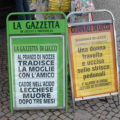I read somewhere that something like a third of the US population moves house (often changing town as well) every year. Even if that number is exaggerated, it’s certainly true that Americans move far more than Europeans do, so many of the necessary steps are very routine in the US.
In Italy, it’s not so simple. Take forwarding mail. In the US, you pick up a form at the post office (and often other places), fill it out (for the entire household) with the old and new addresses, sign it, and hand it in at any post office, or even mail it. The service is free and continues for a year.
In Lecco, I had to go to the post office to pick up a form that is used so rarely that all they could give me was a poor photocopy of it. Two copies, actually, because you need to fill out a form for each adult member of the family, and supply a photocopy of each adult’s identity card; any minors should be put on one of the parents’ forms.
You should do this at least 10 days before the date you want forwarding to start, which I didn’t know when I went to the post office on the Friday before Monday’s move. But the postmaster reassured me that, since we were moving within the same town, the service would actually start Monday for regular mail. Registered mail needs a few more days to work through the system, and if you’re moving to another town it can take up to 10 days for the paperwork to reach your new post office. You can choose to forward for 6, 9, or 12 months, and you pay – 12 euros per household for 12 months.
The postmaster recommended that we also leave a note about the change of address for our mail carrier (postino, or in our case, postina, since ours was female). Enrico and I were running errands, so I asked Ross to do it. She composed a very nice note thanking the lady for her kindness and good service (deservedly so – everyone who works for the post office in Lecco seems to be very nice, as well as efficient). I don’t think the postina had ever had a note like that from a customer; when she saw it on Monday, she buzzed me to come down for the day’s mail (since we were in the midst of moving), kissed me goodbye, and wished us well in our new home.
I mentioned before that you need to notify your local town hall of your change of address, so they can send you ballots at voting time. Interestingly, it is NOT necessary to change your carta d’identita’ (identity card) for a change of address, until the card itself expires (every five years). In fact, they will refuse to change it before it expires, unless you lose or destroy it. I’m told that running it through the washing machine is a very effective way to destroy it; just be prepared to demonstrate the remaining shreds at the ufficio d’anagrafe (population records office) when you go to get it replaced.
About that ID card: Many Americans get itchy at the idea of a national ID card, even though a driver’s license (or non-driver ID from your local driving authority) is in effect used as an ID card all over the US. In Italy, and most of Europe I believe, everyone has an ID card, and thinks nothing of it. Foreign residents are also entitled to an ID card in Italy. I got by without one for years, didn’t see a real need for it until, strangely enough, it would have been handy in applying for an Indian visa. (When you apply for a visa from a country which is not your country of passport, you usually have to supply proof of residence in the country from which you are applying.) So now I have my own carta d’identita’. I previously used my US passport, which caused slight extra paperwork in opening bank accounts and so on, but was not a huge problem.
For all financial purposes in Italy, you do need a codice fiscale (fiscal number) which is more or less equivalent to an American Social Security number. The codice fiscale is made up of the first three consonants in your last and first names (e.g., in my case, STR DDR), the last two digits of your year of birth, some bits in the middle calculated from your birth month, and a number signifying your town of birth – there’s a different number for every tiny little town in Italy, but the same code (Z404) is used for EVERYONE born outside Italy, from Australia to Zimbabwe.
Because the codice fiscale is calculated and not random, it is possible for two people born in the same town on the same day to have the same codice fiscale, if they happen also to have the same name, or names with the same sequence of consonants. Theoretically this should be checked before a codice fiscale is issued, but there have been cases of identical codes being issued to two different people, resulting in all sorts of confusion, such as the man who was still alive but couldn’t draw his pension because his code sharer had died.
Some more issues pertinent to home ownership:
All homeowners pay a tassa sui rifiuti (garbage tax), calculated on the size of your home and I suppose the number of family members. When you move, you need to go to the local tax office to move your tassa sui rifiuti as well. And, as I have just learned, you can’t put garden trimmings with the rest of the umido (compostable food scraps); you have to take them to the town dump, which means that you have to have a magnetic-stripe card to give you access to the dump. This you acquire from the Ufficio d’Ambiente (Office of the Environment) at the Comune (town hall). [more on recycling]
If you move to a different town (or far across a city), you also need to change your medico di famiglia (family doctor); this is done at the local ASL office (Azienda Sanita’ Locale – local health company).
And you need to stay on top of Telecom Italia. I called them on September 8th to inform them of our move on the 27th. I called again twice, and each time was told that the process was underway. Enrico called on October 4th, and found out that the process had come to a dead stop. The previous owner of our house had had the phone line registered as a business line, possibly because he was claiming a tax deduction on using part of the house as an office. Now we’re trying to switch it to a home line, causing endless confusion at Telecom. At one point they claimed they needed to do a technical test on the line, even though I was calling them from it (the old owner’s number is still active at the house, though it was supposed to be turned off 10 days ago).
Further, our house number has a letter in it, and Telecom’s computer system doesn’t know what to do with this, and/or the paperwork can get lost in the computer depending on whether a capital or small letter is entered. Gah!
So Monday Enrico told them to start all over again with a new contract and new phone number, which the Telecom lady advised us would be faster than trying to resolve the confusion over the old contract. However, we have no idea how long it will take to get a technician out for the new line…







